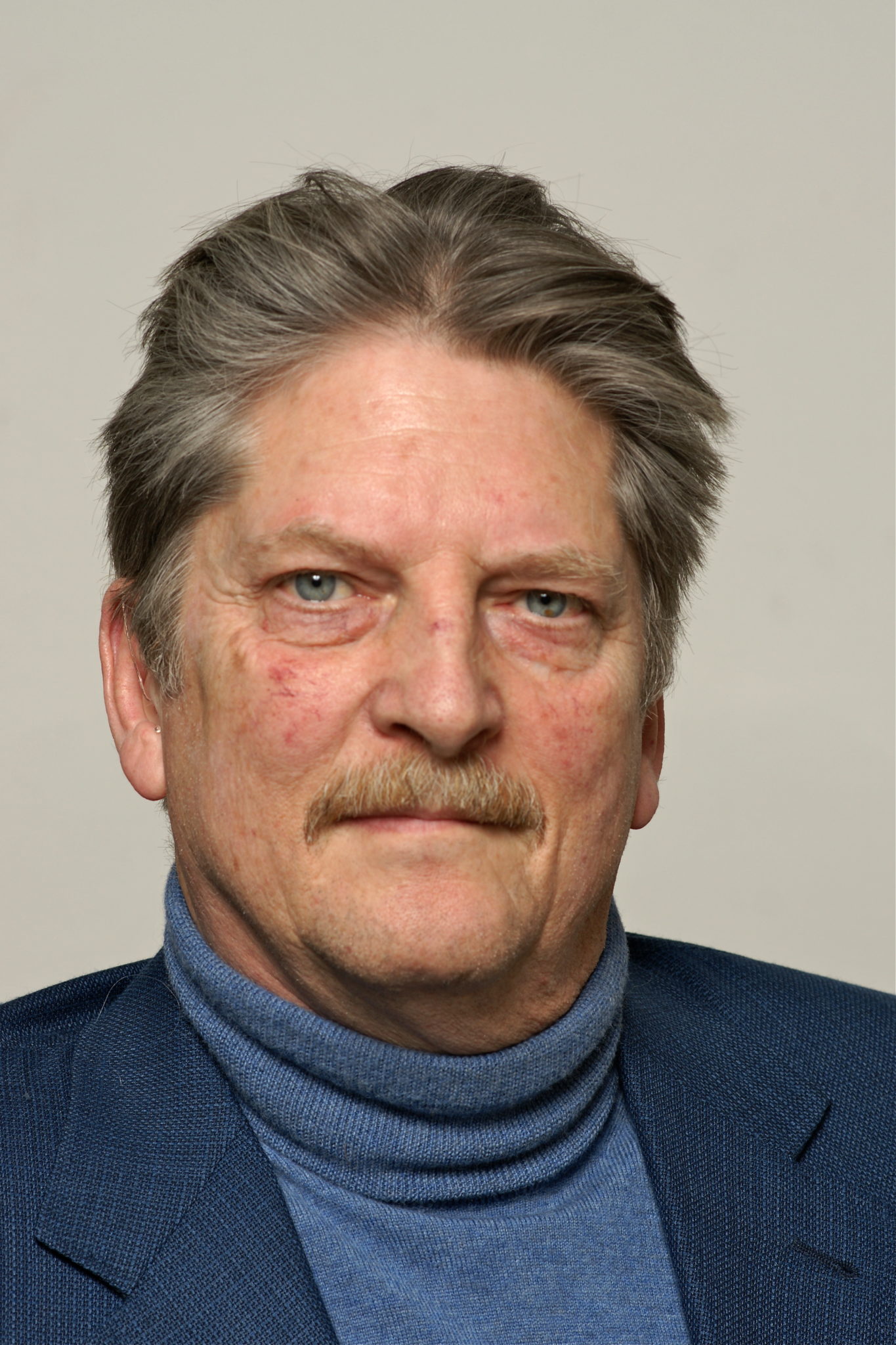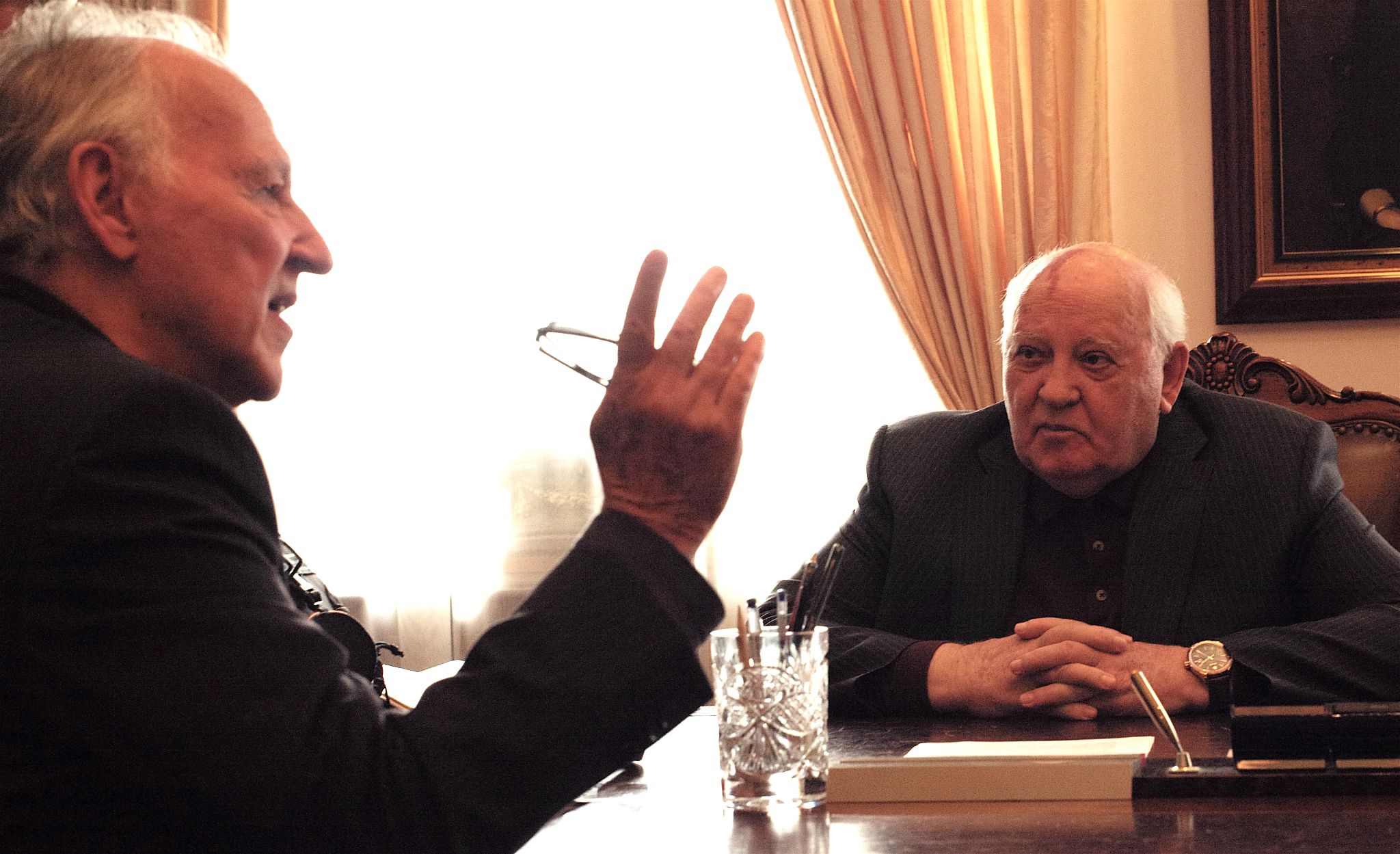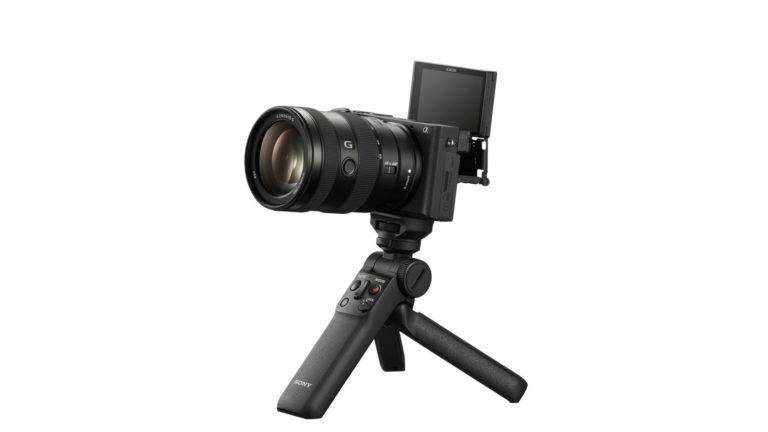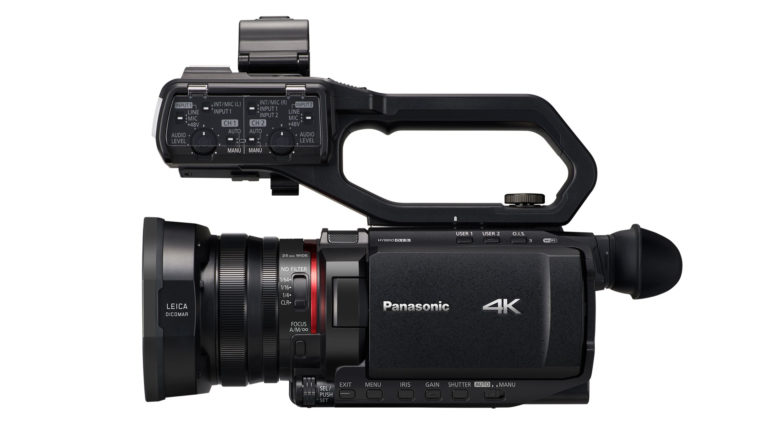
Werner Herzog always made documentaries together with his narrative films but, until the 1982 Fitzcarraldo, the latter got far more attention. After that point, where his ambition and hubris got the better of him (as documented by Les Blank’s Burden of Dreams), his nonfiction films have generally been more successful than his fiction work. Together with co-director André Singer, he turns his attention to the end of the Cold War in Meeting Gorbachev.
Structured around three contemporary interviews with Mikhail Gorbachev telling his life story through the fall of the USSR in 1992, it’s a more conventional film than usual for Herzog — one can tell it was produced by U.S. cable channel History (as well as European TV.) But it paints a sympathetic picture of a man who once had the world at his command and used his power to change it for the better, only to become persona non grata in his own country when the breakup of the U.S.S.R. and the arrival of capitalism did not make life better for ordinary Russians.
Singer started working as a producer with Herzog 27 years ago. After producing documentaries for television for years, he now heads the production company Spring Films. His best-known movie as a director is the 2014 Night Will Fall, which looked back at the Allies’ liberation of concentration camps at the end of World War II and Britain’s cinematic documentation of the Holocaust. I talked to him by phone from Moscow shortly after the US premiere of Meeting Gorbachev at the Tribeca Film Festival. It opens today at Film Forum in New York and the Nuart Theatre in Los Angeles.
StudioDaily: What techniques did you use to research the historical footage? Has technology changed that process?
André Singer: Well, most of it was done in Russia. We had specialists, historical archivists working on it. A lot of it was based on [William] Taubman’s book [Gorbachev: His Life and Times], which both Werner and I devoured. That was a very good source, as well as his autobiography.
Did your three days of interviews with Gorbachev proceed in the chronological order we see in the film?
Not particularly. We worked with his own research center in Moscow. The structure was such that, after we did an interview, we went back for material that would illustrate it. So if he talked about nuclear arms or his relationship with Reagan or Bush, we would ask the archivists at his foundation if they had any material to illustrate that part of his life. It wasn’t meant to be a chronological history. It was meant as a delving into the character of the man himself. I’ve just been showing it in Moscow. It closed the Moscow Film Festival. The audience and press asked time and time again, “Is this meant to be a history or is this about a personality?” We felt that it was much more about the personality. Werner himself, when asked in Toronto, “Why didn’t you put this bit of history or that bit of history in it?” stood up and said “I’m not a historian, I’m a poet.” That ended any other discussion about the chronology.
Did the project originate with you and Herzog or the TV channels that produced it?
This came about because German television, WDR, were fascinated by anything that dealt with Eastern Europe and Russia. I had made a film for them previously that dealt with the Holocaust, which was very successful. They asked “Can you get access to Gorbachev?” It started out as general discussion and it evolved into me saying to Werner, who I’ve known for 30 years and have worked together with many times, “Look, if we can get hold of Gorbachev, would you be interested in participating?” Werner was more interested, originally, in the historical end because of the unification of Germany. We were approached by A&E in America and WDR to make something about the man himself. There was no other serious pressure to cover this or that event. Some things were obvious. We wanted to cover the big events of his life, but beyond that it was open.

From left: André Singer, Werner Herzog, and Mikhail Gorbachev
Did you bring up to Gorbachev himself your notion of him as a tragic figure?
You really only have to meet him and see. Werner will ask questions like that and point out the tragedy of the man in a way that I cringe at. I couldn’t do it. He was the right person to interpret that. When he saw the film, there’s a point where Werner says that Gorbachev is a tragic figure like King Lear, having lost his kingdom and his wife. Gorbachev has no complaints. At the moment, he’s in a city where they don’t like him. He’s alone, he’s not living in luxury, he’s ill and in and out of hospital. Politically, he’s been a tragic figure ever since he lost power in 1992. The fact that he never got a chance to achieve all his great ambitions is perhaps a bigger tragedy than the personal one.
How did you and Herzog divide up the work of directing the film?
It was quite simple. The original contact was an invitation to me to direct a film. I thought a film of this nature would work much better with Werner at the helm, particularly doing the interviews. We discussed the idea of doing that. We divided it up economically. He did the interviews. We went to Moscow four times and he did the three main interviews with Gorbachev. I did the other interviews, going ’round to James Baker and George Schultz, except in Germany. I then put the film together. Werner came across to London, and he wrote a script to fit the interview while we were doing the editing. He doesn’t direct films with other people, but this one has a very different structure. We saw eye-to-eye on everything. I can’t imagine he’ll do it again. But it worked extremely well.

Werner Herzog (left) and Mikhail Gorbachev
You’ve been directing films since 1975, and you also led a unit at the BBC producing films by other directors. How do you think the fact that you’ve been a producer has affected your own films?
Werner is just a director and writer. The long experience I’ve had as a producer enabled me to figure out how best to work with him. I am a huge admirer of his creative talents. They are things that I don’t have. He respects the idea that production enables him to do what he wants. We play to each other’s strengths.
How long did the shoot take?
The overall shoots were spasmodic. We did them over a period of 18 months. We could only do them in brief bursts with Gorbachev, because he was ill and kept going back to the hospital. So we kept going back to Moscow, and it was tricky. Werner is one of the world’s fastest post-producers, so we didn’t linger in the editing.
People in Russia and Eastern Europe tend to view Gorbachev a lot less positively than Westerners. Did you talk to anyone who was more critical of his legacy?
One thing that’s been leveled is that we could have been more critical of the man. We kept an interview with Lech Walesa, who is extremely bitter towards Gorbachev. They never liked each other. There’s a hint of a critical side there. Werner and I were more interested in understanding him as a character, and we were charmed by him. We found him intelligent and perceptive, and very interested in discussing things. We didn’t want to turn around a critical biography. This is how we found him, these are the facts in his past, and this enables Gorbachev himself to talk about problems in his past and how he confronted them. I fully admit it comes across as a very positive view of the man. But that’s what we believed in.

From left: André Singer, Werner Herzog and Mikhail Gorbachev
One thing that really comes across is that he changed the world in his 50s, but he’s lived for more than 25 years after the U.S.S.R. broke up. You get the sense that he didn’t know what to do with the rest of his life.
That’s a fair point. It’s absolutely true that he was only really in a position of power for seven years. Being the most important, or alongside Reagan one of the two most important men in the world went to nothing. I don’t think he’s a megalomaniac, but it must’ve been quite a dramatic change. He made one more attempt to get into power and failed miserably. It was very easy for the Russian people to blame him for the downfall of the Soviet empire, even though that’s not what he wanted. So he was a pariah. That must have been devastating, really. 25 years of looking back at his glory years and what might have been would daunt anybody. There lies the tragedy again, I suppose.
In all the time you’ve been making documentaries, how do you think the field has changed?
If you’d asked me that question five years ago, I would have given you a rather depressed answer. Like most of my ilk, I thought the documentary was in the doldrums. Suddenly, we’re faced with a boom. I find myself a rather incurable optimist. The new money that these VOD companies are pouring into the field may change the kind of films that are being made, but there are more than ever, at any time I can imagine in the whole period I’ve been watching. Anyone can tackle it, without a lot of money. You can watch it on your phone or iPad. I hope I’m not proven wrong.
Did you enjoy this article? Sign up to receive the StudioDaily Fix eletter containing the latest stories, including news, videos, interviews, reviews and more.









